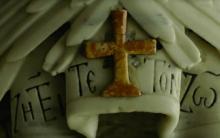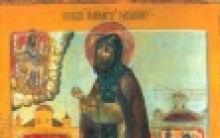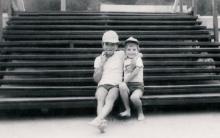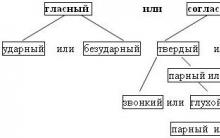Perhaps today, attempts to challenge the authorship of “Quiet Don” are taken a little seriously. Numerous textual examinations have repeatedly confirmed that one of the most famous epics of the 20th century was written by Mikhail Sholokhov. But the question remains: how
Could a twenty-three-year-old boy, who had seen only Veshki and Moscow in his life, write such deep, rich, juicy, psychologically correct prose?
And another question: how could “The Birthmark,” the famous story about how a red partisan killed a white officer, sat down to take off his good boots - and found himself looting the corpse of his own son - how could a young man who had barely turned twenty write? What did he know at the age of twenty about fatherly feelings, about male military work, about revolution and humanism, about life and death? What happened to him that he was the only one during these years who was able to talk about the Civil
The war not as a holy battle for the people's truth, but as a fratricidal massacre without purpose or meaning? The rest of the literature had to go through a sixty-year journey to start writing about this war in this way...
By 1926, when the piercing, terrible and truthful “Don Stories” were published, Sholokhov was twenty, and behind him he had experience as a food commissar, service in the revolutionary military commissar and a writer of propaganda plays, several meetings of the literary association “Young Guard” and a couple of feuilletons published in the central press. This is all. Where did “Quiet Don” come from, which from the moment it began publication in “October” (Sholokhov is twenty-three years old) became a real popular reading: both old and young snatched from each other the magazines of “October” with new chapters, venerable writers loudly praised the young talent, People's Commissar Lunacharsky himself wrote an enthusiastic review of Sholokhov's novel, and directors Pravova and Rozhdestvensky in 1930 (Sholokhov was twenty-five) made the first film based on the first books of “Quiet Don”. This is the second case after Lermontov of such an early literary debut, but Lermontov at least still had youthful lyrics and the romantic “Mtsyri”, and Sholokhov struck right away - with the prose of an old man wise from the tragic life experience.
And it would be nice if “Quiet Don” shocked only with its epic coverage of events, colorful, rich language, apt detailing and a huge number of talented characters. But that’s not even the point. A stunningly true story about a man drawn against his will into a bloody whirlpool of cruel history, his real - without distortion, tendentiousness and literary officialdom - a difficult path, every movement of his extraordinary mind, every breath of his irrepressible soul - this is what you needed to know about life in order so accurately, so sincerely, so recognizable and at the same time new to lay out, clearly in the palm of your hand, in front of the reader?
Literary theory is unable to provide an answer to Sholokhov’s questions.
But the history of literature, taking everything as it is, testifies: Sholokhov was not measured by years and experience when, in his desperate thirties, risking his neck, he wrote fearless letters to Stalin about the excesses in collectivization and the horrors of the Holodomor in the Kuban (by the way, Stalin, in response to the letters sent a trainload of grain to the starving region), when at almost forty years old he went as a military correspondent to the front of the Great Patriotic War, when he was the first to publish a story about prisoners of war (“The Fate of a Man”), showing the simple heroism of those whom official propaganda called traitors...
Essays on topics:
- Sholokhov dedicated the story “The Fate of Man” to the editor of the Moskovsky Rabochiy publishing house, Evgenia Levitskaya. They met in 1928, when Sholokhov brought...
- According to Sholokhov, he “began writing his novel in 1925. I was attracted by the task of showing the Cossacks in the revolution. I started by participating...
SHOLOKHOV QUESTION
Perhaps today, attempts to challenge the authorship of “Quiet Don” are taken a little seriously. Numerous textual examinations have repeatedly confirmed that one of the most famous epics of the 20th century was written by Mikhail Sholokhov. But the question still remains: how could a twenty-three-year-old boy, who had seen only Veshki and Moscow in his life, write such deep, rich, juicy, psychologically correct prose?
And another question: how could “The Birthmark,” the famous story about how a red partisan killed a white officer, sat down to take off his good boots - and discovered that he was looting over the corpse of his own son - how could a young man who had barely turned twenty write? What did he know at the age of twenty about fatherly feelings, about male military work, about revolution and humanism, about life and death? What happened to him that he was the only one in these years who was able to talk about the Civil War not as a holy battle for the people's truth, but as a fratricidal massacre without purpose or meaning? The rest of the literature had to go through a sixty-year journey to start writing about this war in this way...
By 1926, when the piercing, terrible and truthful “Don Stories” were published, Sholokhov was twenty, and behind him he had experience as a food commissar, service in the Revolutionary Military Commissariat and a writer of propaganda plays, several meetings of the Young Guard literary association and a couple of feuilletons published in the central press. This is all. Where did “Quiet Don” come from, which from the moment it began publication in “October” (Sholokhov is twenty-three years old) became a real popular reading: both old and young snatched from each other the magazines of “October” with new chapters, venerable writers loudly praised the young talent, People's Commissar Lunacharsky himself wrote an enthusiastic review of Sholokhov's novel, and directors Pravova and Rozhdestvensky in 1930 (Sholokhov was twenty-five) made the first film based on the first books of "Quiet Don". This is the second case after Lermontov of such an early literary debut, but Lermontov at least still had youthful lyrics and the romantic “Mtsyri”, and Sholokhov struck right away - with the prose of an old man wise from the tragic life experience.
And it would be nice if “Quiet Flows the Don” shocked only with its epic coverage of events, colorful, rich language, apt detailing and a huge number of talented characters. But that’s not even the point. A stunningly true story about a man drawn against his will into a bloody whirlpool of cruel history, his real - without distortion, tendentiousness and literary officialdom - a difficult path, every movement of his extraordinary mind, every breath of his irrepressible soul - this is what you needed to know about life in order so accurately, so sincerely, so recognizable and at the same time new to lay out, clearly in the palm of your hand, in front of the reader?
Literary theory is unable to provide an answer to Sholokhov’s questions.
But the history of literature, taking everything as it is, testifies: Sholokhov was not measured by years and experience when, in his desperate thirties, risking his neck, he wrote fearless letters to Stalin about the excesses in collectivization and the horrors of the Holodomor in the Kuban (by the way, Stalin, in response to the letters sent a trainload of grain to a starving region), when at almost forty years old he went as a military correspondent to the front of the Great Patriotic War, when he was the first to publish a story about prisoners of war (“The Fate of a Man”), showing the simple heroism of those whom official propaganda called traitors...
Quiz
"Rereading Sholokhov"
I round Through the pages of life and creativity
Question: Where was M. A. Sholokhov born?
Answer options:
a) x. Kruzhilin;
b) x. Kargin;
c) x. Gremyachiy Log.
Question: Where did M. A. Sholokhov spend his childhood and youth?
Answer options:
a) x. Kargin
b) Boguchar
c) Art. Veshenskaya
Question: From what year did M. A. Sholokhov begin to write?
Answer options:
a) since 1923
b) since 1924
c) since 1925
Question: In what literary genre were the first published works of M. A. Sholokhov written?
Answer options:
a) essay;
b) story;
c) feuilleton.
Question: What was the name of the feuilleton - the first published work of M. A. Sholokhov?
Answer options:
a) “Test”;
b) “Three”;
c) "Inspector".
Question: In which Moscow newspaper did M. A. Sholokhov’s literary debut take place?
Answer options:
a) “Komsomolskaya Pravda”;
b) “Youthful Truth”;
c) “Pioneer Truth.”
Question: Under what pseudonym did the first feuilletons of the aspiring writer appear in print?
Answer options:
a) M. Kazak;
b) M. Kruzhilin;
c) M. Sholokh.
Question: What was the name of Sholokhov’s first published story?
Answer options:
a) “Nakhalenok”
b) “Mole”
c) "Shepherd"
Question: What was the name of M. A. Sholokhov’s first book?
Answer options:
a) “Don Stories”;
b) “Azure Steppe”;
c) “Early stories.”
Question: Which work by M. A. Sholokhov was not written during the Great Patriotic War?
Answer options:
a) “The Fate of Man”;
b) “The Science of Hate”;
c) “They fought for their homeland.”
Question: In what year was M. A. Sholokhov awarded the Nobel Prize?
Answer options:
a) 1933
b) 1960
c) 1965
Question: Which writer owns the lines dedicated to M. A. Sholokhov: “This is power! This is realism! Imagine, a young Cossack from Veshenskaya created such an epic of people’s life, reached such depth in the depiction of characters, showed such a deep tragedy that, by God, he was ahead of all of us!..”
Answer options:
a) A. Serafimovich;
b) A. Fadeev;
c) A. M. Gorky.
2nd round Find out the hero by description
Question: “Near the table, turning the wick of the lamp, facing Davydov, stood a tall, straight-shouldered man... He was broad in the chest and had pincer legs like a cavalry. Over his yellowish eyes with oversized, resin-filled pupils, splayed black eyebrows grew together. He would have been handsome with that discreet but memorable masculine beauty, if not for the too predatory cut of the nostrils of his small hawk nose, and not for the cloudy mist in his eyes.” Who is this?
Answer options:
a) Andrey Razmetnov;
b) Kondrat Maydannikov;
c) Makar Nagulnov.
Question: “She looked no more than twenty-five years old. Small freckles thickly covered her long cheeks, and her motley face resembled a magpie's egg. But there was some kind of alluring and unclean beauty in her tar-black eyes, throughout her lean, stately figure. Her round, gentle eyebrows were always slightly raised, it seemed that she was constantly waiting for something joyful; bright lips held a smile at the ready at the corners, not covering the tightly fused horseshoe of convex teeth. She walked, moving her sloping shoulders, as if she was waiting for someone to press her from behind, to hug her girlish narrow shoulder.”
Answer options:
a) Lushka Nagulnova;
b) Varvara Kharlamova;
c) Aksinya Astakhova.
Question: He had, “the same as his father’s, a drooping kite nose, in slightly slanting slits, blue almonds of hot eyes, sharp slabs of cheekbones covered with brown, blushing skin. He was just as slouched as his father, even in their smile they both had a common, bestial quality.”
Answer options:
a) Dmitry Korshunov;
b) Grigory Melekhov;
c) Semyon Davydov.
III round. Which of the heroes of M.A. Sholokhov owns these lines
Question: “Wustritsa, I’m telling you in Russian! The frog is scum, but the Wustrit has noble blood! My dear godfather, under the old pressure of General Filimonov himself, served as an orderly and said that the general even swallowed hundreds of them on an empty stomach! Ate straight from the root! Wustritsa isho won’t hatch from a shell, but he’s already calling for her to come with a fork. It will pierce through and - yours is gone! She peeps pitifully, and you know, he’s pushing it down her neck. How do you know, maybe she, this damn thing, is of the Wustric breed? The generals approved, and I, perhaps, put it in there for the sake of profit for you fools. For the bite..."
Answer options:
a) Lopakhin;
b) Grandfather Shchukar;
c) Polovtsians.
Question: “I also found a groom! Why the hell do I need you, such a slobbering coward? So I married you, keep your pockets wider! You’re embarrassed to walk through the farm with me, but there you go, “let’s get married”! He's just afraid, he looks around at everyone, he shys away from the kids like a madman. Well, go with your authority to the pasture..., lie there on the grass alone, you unfortunate bastard! I thought that you were a person like a person, but you are like my Makarka: he has one world revolution on his mind, and you have authority. Yes, any woman with you will die of boredom!”
Answer options:
a) Aksinya Astakhova;
b) Lukerya Nagulnova;
c) Dunyasha Melekhova.
Question: “...I miss him, dear grandmother. I'm drying on my little eyes. I don’t have time to sew up my skirt: every day it gets wider... The base will pass by, and my heart is boiling... I would fall to the ground, kiss its marks... Maybe I’d dry it with something?.. Help, grandma!.. Help, dear! I'll give you what it's worth. Take my last shirt, just give me some help!”
Answer options:
a) Natalya Korshunova;
b) Daria Melekhova;
c) Aksinya Astakhova.
Both teams and individual participants can take part in the competition. The results of the competition are summed up based on the results of all rounds.
Comp.:
Degtyareva O.V.,
Head of IBO MBUK VR
"Intersettlement Central Library"











Conventional graphic symbols
The problem of the presence of petroleum products in water and how to deal with it See what “PND F” is in other dictionaries
About a six-day work week With a 6-day
What is a social worker?
Root hermitage in the Kursk region: the story of a miracle Root hermitage prayer service for the sick